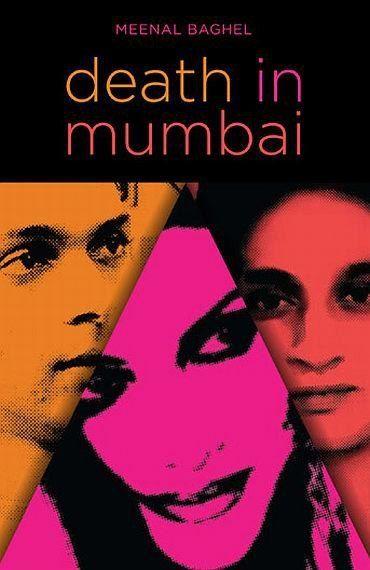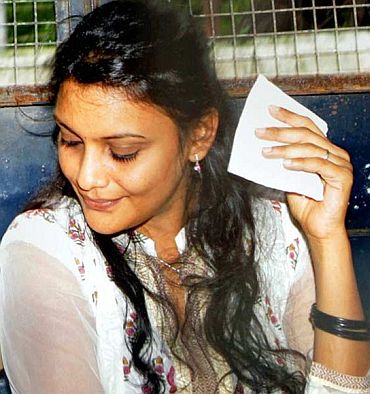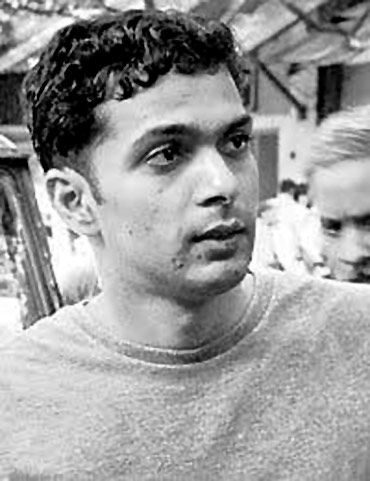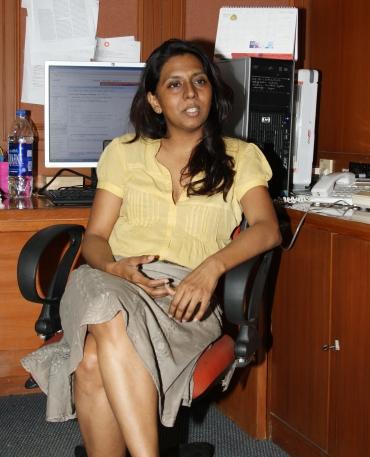Sanchari Bhattacharya speaks to Meenal Baghel, Mumbai Mirror editor and author of Death In Mumbai, about her account of the Neeraj Grover murder case and why she chose it to be the subject of her first book
Much has been written, said and speculated about the May 2008 Neeraj Grover killing in Mumbai, right down to the last gruesome detail. Media reports have tirelessly gone on about how the young television channel executive was caught with the attractive Kannada starlet Maria Monica Susairaj by her boyfriend Emile Jerome Mathew, how he was killed by the naval lieutenant and his body hacked into pieces, and how the duo was finally arrested and found guilty of the ghastly crime.
In her book Death in Mumbai, Meenal Baghel sifts through the obvious facts of the case and digs deeper into the lives and psyche of the three protagonists -- Neeraj, Maria and Emile -- to unravel what made these otherwise ordinary people end up in such extraordinary, blood-stained circumstances.
It meant three years of painstaking compilation of facts, endless hours of patiently waiting in courtrooms and numerous conversations with the accused (later convicted), their friends, family members, policemen, investigators, lawyers and even brokers, Baghel tells Sanchari Bhattacharya in a candid interview.
What drew you to this subject? Why did you find the Neeraj Grover case particularly interesting?
In 2008, I received a call from (publishing firm) Random House, asking me if I would be interested in writing a book on urban crimes.
I found the Neeraj Grover case interesting as it dealt with a lot of elements -- the changing lives of people from small towns, the shift in gender equations, the capacity for violence from seemingly normal people.
'The book is not about what happened that night'
Image: Maria SusairajHow did you go about your research for the book?
Well, it is difficult to chase people and get them to talk. I tracked down family members, friends, eyewitnesses and even brokers who helped her (Maria Susairaj) get a place. I talked to the prosecution side as well -- the policemen, investigators and lawyers.
Did you have problems in getting across to Emile and Maria? How did you make them open up to you?
Through sheer perseverance. I was upfront with everyone I met. I told them that I was writing a book on them. But it still took me three years to put the book together.
Initially, they were wary; there was some amount of hostility. What made a difference to them were maybe my persistence, the fact that I was genuinely interested in their stories, and that I had already talked to their family members and friends.
Tell us about your meetings with Maria and Emile.
The time to speak to them was limited, as I obviously couldn't talk to them while the court was in session. I somehow had to sneak in the time to interact with them.
With Maria, I held many fragmented interviews over a period of three years. Initially, she would talk to me only for five or six minutes. Later, she warmed up to me. Sometimes, she would even forego her lunch and continue talking to me.
I found Emile very cool, collected, dignified and smart.
I wanted to know what kind of people they were. I told them we will not talk about the killing.
The book is not about what happened that night. Those facts are widely known. I wanted to focus on who these people -- Emile, Neeraj and Maria -- actually were, what forces led them, their childhoods, their work, their ambitions and their relationships.
'For Neeraj's parents, no punishment will be enough'
Image: Posters demanding justice for Neeraj GroverYou talked to the grieving families of Neeraj, Emile and Maria. Which family was the toughest to deal with?
I felt the worst for the parents. Emile's father, whom I saw in the courtroom regularly, looked bewildered. His life had been shattered. I couldn't talk to Emile's parents, but I did talk to some of his other relatives.
Neeraj's parents have aged by 10 years in the three years after the murder.
Maria's family, who are well-known in Mysore, are trying to deal with the shame. They have lost everything.
At some level, journalism is intrusive and I was asking them intrusive questions. But I was genuinely interested, patient and attentive. I really wanted to know their stories.
What is your take on the judgment, which many considered to be inadequate? (Emile was found guilty of culpable homicide not amounting to murder and sentenced to 10 years in jail. Maria was convicted on charges of causing disappearance of evidence and sentenced to three-year imprisonment. She was released as she had already spent the term behind bars as an undertrial).
I don't have the legal acumen to comment on that issue. For Neeraj's parents, no punishment will be enough. Maria's parents, on the other hand, think their daughter was vilified. But the court doesn't take emotions into account. It considers the law and facts of the case.
'Emile, Maria and Neeraj had very different ideas of morality'
Image: Emile Jerome MathewDoes the book also depict the changing personality of modern Indian women? For example, someone like Maria is engaged to one man, is in a relationship with another, but goes along with the man she loves while covering up the murder of the latter. The infidelity, deceit, violence -- these are not traits associated with the quintessential 'Indian woman'.
While working on the book, I did find a level of mistrust, misunderstanding between men and women. Especially concerning the conflicting ideas about casual sex or morality which are present even in a modern, cosmopolitan city like Mumbai. For example, Emile, Maria and Neeraj all had very different ideas of morality.
Look at the way it all -- the killing -- became Maria's fault. She became the big villainess, whereas during my research I found, in certain quarters, a grudging respect for Emile's actions as he had, after all, found his fiancee with another man.
We still have preconceived notions of what women should be like. In spite of our so-called modernity, we have problems accepting a sexually emancipated woman.
The Indian woman has changed. She is no longer entirely blameless. This book is about the aspirations of women and the aspirations of people from small towns. I have also tried to explore the vast sweeping social changes that we are in the middle of today. It is a book not only about how the youth are changing but also about how their parents are changing.
'Maria was not necessarily a harlot'
Image: Meenal Baghel, the authorAs the author, did you come across any surprises while researching or writing the book? Any unexpected observations or conclusions that you hadn't foreseen?
I was surprised by my reaction to Maria. She had been portrayed as the villainess. She was under the spotlight -- the Neeraj Grover killing had become the Maria Susairaj case.
Maria, at the time of the incident, had been at a crossroads in her life. She was wondering whether she should get married or if she should pursue a professional career. She was confused, vulnerable, manipulative and stupid to a certain extent. But that is more or less true for all of us.
For me, she gradually became a real person. I got a fuller sense of who she was.
Maria was not necessarily a harlot or a scarlet woman. She had bad taste in men, just like many other women do.
Has either Maria or Emile shown an interest in reading the book?
No, they have not so far. Though I really hope they read the book.
'Neeraj's parents were wondefully sweet'
Image: The grieving parents of Neeraj GroverAre you in touch with Maria? Where is she now?
I am not in touch with her. The last I heard, she had moved back to Mysore (her hometown) and is trying to rebuild her life.
Was there any particular conversation or encounter during the course of your research that has stayed with you?
I spent a day in Kanpur with Neeraj's parents. It was professionally the toughest day of my life. I was, in a way, forcing them to relive memories. But they were wonderfully sweet, even though they were in the throes of such intense grief.
I had gone to Kanpur to ask them questions about their son. Sometimes, you don't like yourself for doing things like that.
While working on the book, I also found out that Maria's mother had already planned the theme and even the colours of her wedding to Emile.
I talked to many of Emile's friends in the navy and they had nothing but only good things to say about him. They said he had been a very bright officer with a good career ahead of him.
The entire incident was a tragedy of many acts.







article